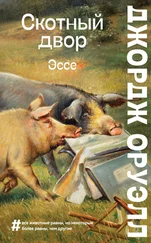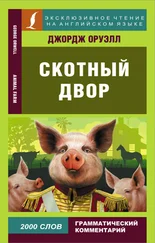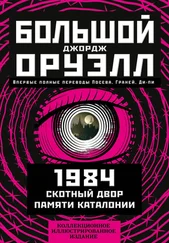| Now he had recognized himself as a dead man it became important to stay alive as long as possible. |
Теперь, когда он понял, что он мертвец, важно прожить как можно дольше. |
| Two fingers of his right hand were inkstained. |
Два пальца на правой руке были в чернилах. |
| It was exactly the kind of detail that might betray you. |
Вот такая мелочь тебя и выдаст. |
| Some nosing zealot in the Ministry (a woman, probably: someone like the little sandy-haired woman or the dark-haired girl from the Fiction Department) might start wondering why he had been writing during the lunch interval, why he had used an old-fashioned pen, WHAT he had been writing--and then drop a hint in the appropriate quarter. |
Какой-нибудь востроносый ретивец в министерстве (скорее, женщина -- хотя бы та маленькая с рыжеватыми волосами, или темноволосая из отдела литературы) задумается, почему это он писал в обеденный перерыв, и почему писал старинной ручкой, и что писал, а потом сообщит куда следует. |
| He went to the bathroom and carefully scrubbed the ink away with the gritty dark-brown soap which rasped your skin like sandpaper and was therefore well adapted for this purpose. |
Он отправился в ванную и тщательно отмыл пальцы зернистым коричневым мылом, которое скребло, как наждак, и отлично годилось для этой цели. |
| He put the diary away in the drawer. |
Дневник он положил в ящик стола. |
| It was quite useless to think of hiding it, but he could at least make sure whether or not its existence had been discovered. |
Прячь, не прячь -- его все равно найдут; но можно хотя бы проверить, узнали о нем или нет. |
| A hair laid across the page-ends was too obvious. |
Волос поперек обреза слишком заметен. |
| With the tip of his finger he picked up an identifiable grain of whitish dust and deposited it on the corner of the cover, where it was bound to be shaken off if the book was moved. |
Кончиком пальца Уинстон подобрал крупинку белесой пыли и положил на угол переплета: если книгу тронут, крупинка свалится. |
| Chapter 3 |
III |
| Winston was dreaming of his mother. |
Уинстону снилась мать. |
| He must, he thought, have been ten or eleven years old when his mother had disappeared. |
Насколько он помнил, мать исчезла, когда ему было лет десять-одиннадцать. |
| She was a tall, statuesque, rather silent woman with slow movements and magnificent fair hair. |
Это была высокая женщина с роскошными светлыми волосами, величавая, неразговорчивая, медлительная в движениях. |
| His father he remembered more vaguely as dark and thin, dressed always in neat dark clothes (Winston remembered especially the very thin soles of his father's shoes) and wearing spectacles. |
Отец запомнился ему хуже: темноволосый, худой, всегда в опрятном темном костюме (почему-то запомнились очень тонкие подошвы его туфель) и в очках. |
| The two of them must evidently have been swallowed up in one of the first great purges of the fifties. |
Судя по всему, обоих смела одна из первых больших чисток в 50-е годы. |
| At this moment his mother was sitting in some place deep down beneath him, with his young sister in her arms. |
И вот мать сидела где-то под ним, в глубине, с его сестренкой на руках. |
| He did not remember his sister at all, except as a tiny, feeble baby, always silent, with large, watchful eyes. |
Сестру он совсем не помнил -- только маленьким хилым грудным ребенком, всегда тихим, с большими внимательными глазами. |
| Both of them were looking up at him. |
Обе они смотрели на него снизу. |
| They were down in some subterranean place--the bottom of a well, for instance, or a very deep grave--but it was a place which, already far below him, was itself moving downwards. |
Они находились где-то под землей -- то ли на дне колодца, то ли в очень глубокой могиле -- и опускались все глубже. |
| They were in the saloon of a sinking ship, looking up at him through the darkening water. |
Они сидели в салоне тонущего корабля и смотрели на Уинстона сквозь темную воду. |
| There was still air in the saloon, they could still see him and he them, but all the while they were sinking down, down into the green waters which in another moment must hide them from sight for ever. |
В салоне еще был воздух, и они еще видели его, а он -- их, но они все погружались, погружались в зеленую воду -- еще секунда, и она скроет их навсегда. |
| He was out in the light and air while they were being sucked down to death, and they were down there because he was up here. |
Он на воздухе и на свету, а их заглатывает пучина, и они там, внизу, потому что он наверху. |
| He knew it and they knew it, and he could see the knowledge in their faces. |
Он понимал это, и они это понимали, и он видел по их лицам, что они понимают. |
| There was no reproach either in their faces or in their hearts, only the knowledge that they must die in order that he might remain alive, and that this was part of the unavoidable order of things. |
Упрека не было ни на лицах, ни в душе их, а только понимание, что они должны заплатить своей смертью за его жизнь, ибо такова природа вещей. |
| He could not remember what had happened, but he knew in his dream that in some way the lives of his mother and his sister had been sacrificed to his own. |
Уинстон не мог вспомнить, как это было, но во сне он знал, что жизни матери и сестры принесены в жертву его жизни. |
| It was one of those dreams which, while retaining the characteristic dream scenery, are a continuation of one's intellectual life, and in which one becomes aware of facts and ideas which still seem new and valuable after one is awake. |
Это был один из тех снов, когда в ландшафте, характерном для сновидения, продолжается дневная работа мысли: тебе открываются идеи и факты, которые и по пробуждении остаются новыми и значительными. |
| The thing that now suddenly struck Winston was that his mother's death, nearly thirty years ago, had been tragic and sorrowful in a way that was no longer possible. |
Уинстона вдруг осенило, что смерть матери почти тридцать лет назад была трагической и горестной в том смысле, какой уже и непонятен ныне. |
| Tragedy, he perceived, belonged to the ancient time, to a time when there was still privacy, love, and friendship, and when the members of a family stood by one another without needing to know the reason. |
Трагедия, открылось ему, -- достояние старых времен, времен, когда еще существовало личное, существовала любовь и дружба, и люди в семье стояли друг за друга, не нуждаясь для этого в доводах. |
| His mother's memory tore at his heart because she had died loving him, when he was too young and selfish to love her in return, and because somehow, he did not remember how, she had sacrificed herself to a conception of loyalty that was private and unalterable. |
Воспоминание о матери рвало ему сердце потому, что она умерла, любя его, а он был слишком молод и эгоистичен, чтобы любить ответно, и потому, что она каким-то образом -он не помнил, каким -- принесла себя в жертву идее верности, которая была личной и несокрушимой. |
| Such things, he saw, could not happen today. |
Сегодня, понял он, такое не может случиться. |
| Today there were fear, hatred, and pain, but no dignity of emotion, no deep or complex sorrows. |
Сегодня есть страх, ненависть и боль, но нет достоинства чувств, нет ни глубокого, ни сложного горя. |

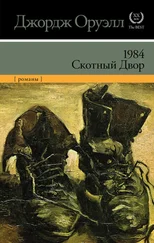
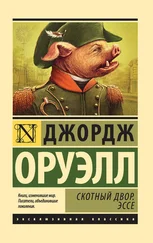

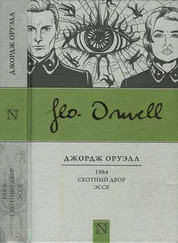
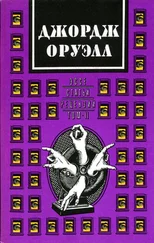
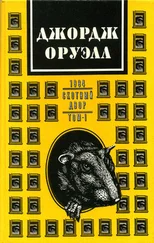
![Джордж Оруэлл - Скотный двор. Эссе [сборник litres]](/books/431073/dzhordzh-oruell-skotnyj-dvor-esse-sbornik-litres-thumb.webp)
